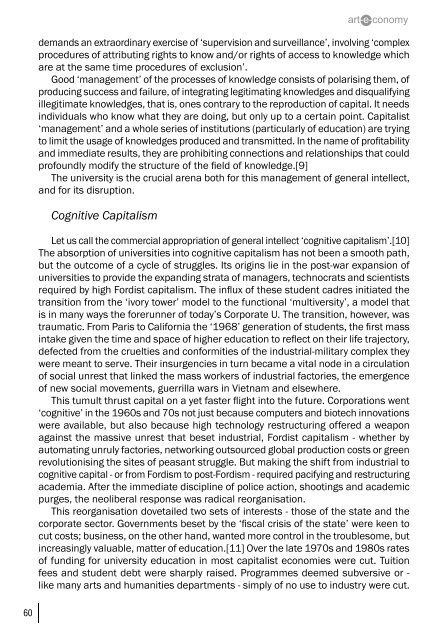art-e-conomy _ reader - marko stamenkovic
art-e-conomy _ reader - marko stamenkovic
art-e-conomy _ reader - marko stamenkovic
Create successful ePaper yourself
Turn your PDF publications into a flip-book with our unique Google optimized e-Paper software.
60<br />
demands an extraordinary exercise of ‘supervision and surveillance’, involving ‘complex<br />
procedures of attributing rights to know and/or rights of access to knowledge which<br />
are at the same time procedures of exclusion’.<br />
Good ‘management’ of the processes of knowledge consists of polarising them, of<br />
producing success and failure, of integrating legitimating knowledges and disqualifying<br />
illegitimate knowledges, that is, ones contrary to the reproduction of capital. It needs<br />
individuals who know what they are doing, but only up to a certain point. Capitalist<br />
‘management’ and a whole series of institutions (p<strong>art</strong>icularly of education) are trying<br />
to limit the usage of knowledges produced and transmitted. In the name of profitability<br />
and immediate results, they are prohibiting connections and relationships that could<br />
profoundly modify the structure of the field of knowledge.[9]<br />
The university is the crucial arena both for this management of general intellect,<br />
and for its disruption.<br />
Cognitive Capitalism<br />
Let us call the commercial appropriation of general intellect ‘cognitive capitalism’.[10]<br />
The absorption of universities into cognitive capitalism has not been a smooth path,<br />
but the outcome of a cycle of struggles. Its origins lie in the post-war expansion of<br />
universities to provide the expanding strata of managers, technocrats and scientists<br />
required by high Fordist capitalism. The influx of these student cadres initiated the<br />
transition from the ‘ivory tower’ model to the functional ‘multiversity’, a model that<br />
is in many ways the forerunner of today’s Corporate U. The transition, however, was<br />
traumatic. From Paris to California the ‘1968’ generation of students, the first mass<br />
intake given the time and space of higher education to reflect on their life trajectory,<br />
defected from the cruelties and conformities of the industrial-military complex they<br />
were meant to serve. Their insurgencies in turn became a vital node in a circulation<br />
of social unrest that linked the mass workers of industrial factories, the emergence<br />
of new social movements, guerrilla wars in Vietnam and elsewhere.<br />
This tumult thrust capital on a yet faster flight into the future. Corporations went<br />
‘cognitive’ in the 1960s and 70s not just because computers and biotech innovations<br />
were available, but also because high technology restructuring offered a weapon<br />
against the massive unrest that beset industrial, Fordist capitalism - whether by<br />
automating unruly factories, networking outsourced global production costs or green<br />
revolutionising the sites of peasant struggle. But making the shift from industrial to<br />
cognitive capital - or from Fordism to post-Fordism - required pacifying and restructuring<br />
academia. After the immediate discipline of police action, shootings and academic<br />
purges, the neoliberal response was radical reorganisation.<br />
This reorganisation dovetailed two sets of interests - those of the state and the<br />
corporate sector. Governments beset by the ‘fiscal crisis of the state’ were keen to<br />
cut costs; business, on the other hand, wanted more control in the troublesome, but<br />
increasingly valuable, matter of education.[11] Over the late 1970s and 1980s rates<br />
of funding for university education in most capitalist economies were cut. Tuition<br />
fees and student debt were sharply raised. Programmes deemed subversive or -<br />
like many <strong>art</strong>s and humanities dep<strong>art</strong>ments - simply of no use to industry were cut.


